By Christopher Winn, Programme Leader for MSc Football Business
May 2019 may seem a world away now, as goals from Anwar El Ghazi and John McGinn ensured Aston Villa saw off Frank Lampard’s Derby County in the Championship play-off final at Wembley, joining Norwich City and Sheffield United in the lucrative Premier League.
Flash forward almost a year and the world is in lockdown, with the recommencement of the football season still an open question. However, with the vast majority of Championship clubs now having published their 2018/19 accounts, this presents the opportunity to both reminisce, but also consider their latest financial state of play and how this may signal things to come.
This analysis considers the 20 2018/19 Championship clubs to have either published accounts at Companies House, or announce abbreviated results at the time of writing (April 14th 2020). Derby County and Brentford have taken advantage of the government’s allowance to extend their filing deadlines by three months, Bolton Wanderers have not published accounts since the 2016/17 season, and Sheffield Wednesday are not due to file until May at the earliest. While accurate league financial totals are not yet possible, the emergence or continuance of trends and patterns should still hold true. Also note figures for Wigan relate to a 13-month reporting period.
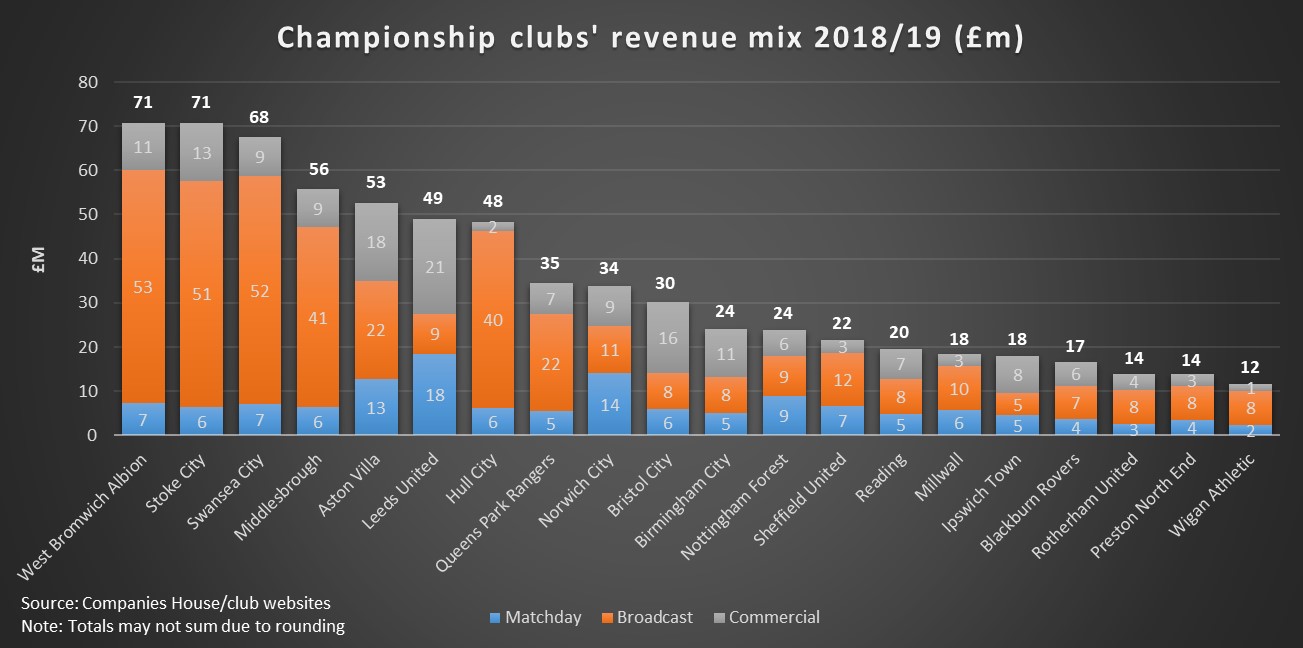
With the four clubs still to publish their revenues, the 20 clubs under analysis have reported revenues totalling c.£695m.
Championship revenues are typically influenced by the receipt of parachute payments by clubs recently relegated from the Premier League, equating to a percentage of the equal share elements of domestic and international broadcast revenues received by Premier League clubs. Under the current mechanism, this amounts to 55% in the first year after relegation, 45% in the second year, and if the club spent two or more consecutive years in the Premier League, a third payment of 20% in the third year.
In 2018/19, seven Championship clubs received parachute payments, amounting to a total of c.£230m, representing a third of the reported revenues across these 20 clubs. As a result, these seven clubs filled the top eight positions in terms of revenue, a picture unlikely to change once the remaining clubs are factored in.
To their credit, Leeds United are the only club to meet such levels of revenue generation despite not being in receipt of parachute payments. Leeds were the highest revenue generators in the league on a matchday and commercial basis, with the latter seeing significant increases year-on-year, leading to greater revenues than parachute recipients Hull City and Queens Park Rangers.

In terms of overall mix, the 20 clubs analysed demonstrate a reliance on broadcast revenue amounting to 56%. However, removing the inconsistency of parachute payments, this broadcast reliance reduces to 34%, with commercial at 36% and matchday at 30%.
Both assessments are valid considerations given the ongoing pandemic. The Premier League has reported they face a £750m broadcast hit if the 2019/20 season does not complete. One might expect that an element of this could be deducted from parachute payments this season should this come to pass, reducing the anticipated (and likely already spent) distributions to parachute recipients.
Equally, the data gathered to date suggests an average matchday revenue of c.£6.9m. Assuming 24 home games per season (23 league, one cup) and 75% general admissions contribution, Championship clubs are currently foregoing in excess of £200k matchday cash inflow on average per home game not played. Discounting parachute recipients, it is clear to see the relative importance of such matchday income to Championship clubs in relative and absolute terms.
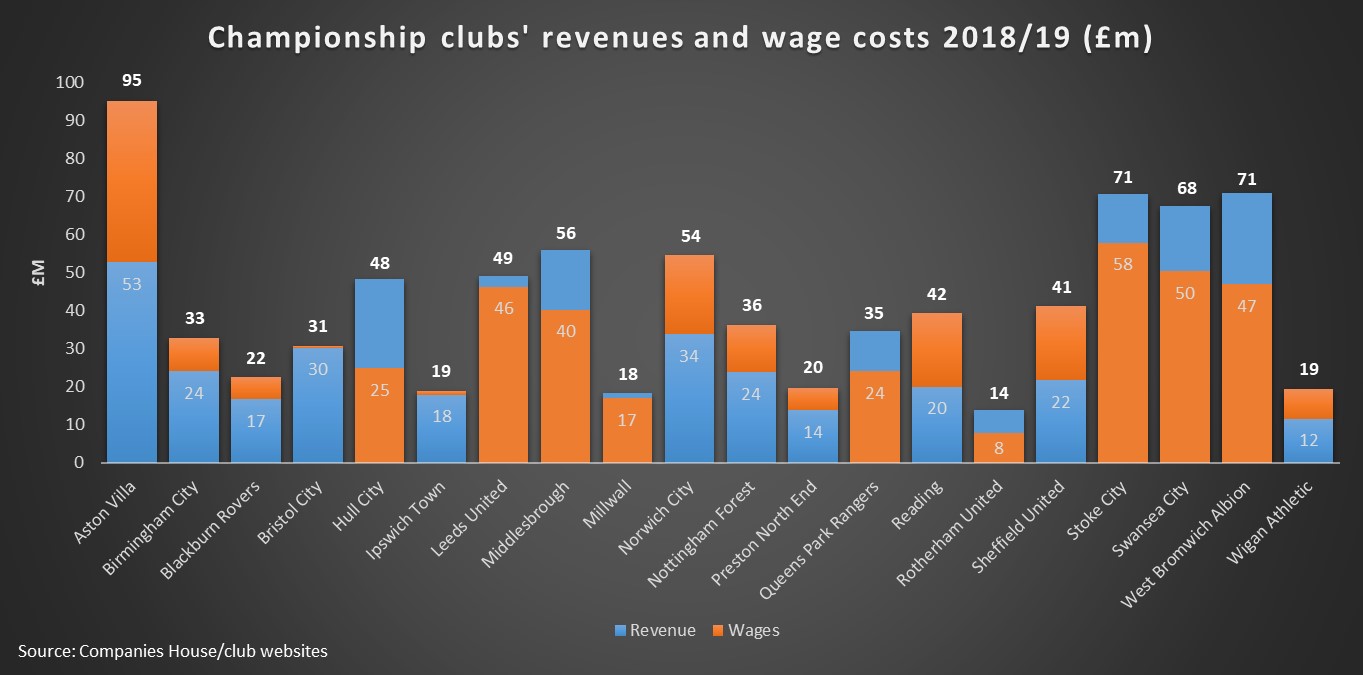
The Championship in recent years has become synonymous with mounting losses, mostly driven by over-investment in player wages in the pursuit of promotion to the Premier League promised land. The 2018/19 season showed no sign of such behaviour abating; as demonstrated above, over half of the 20 clubs reporting results to date spent more on wages than they generated in revenues, with Aston Villa clearly outspending any other club on an absolute basis in their promotion campaign.
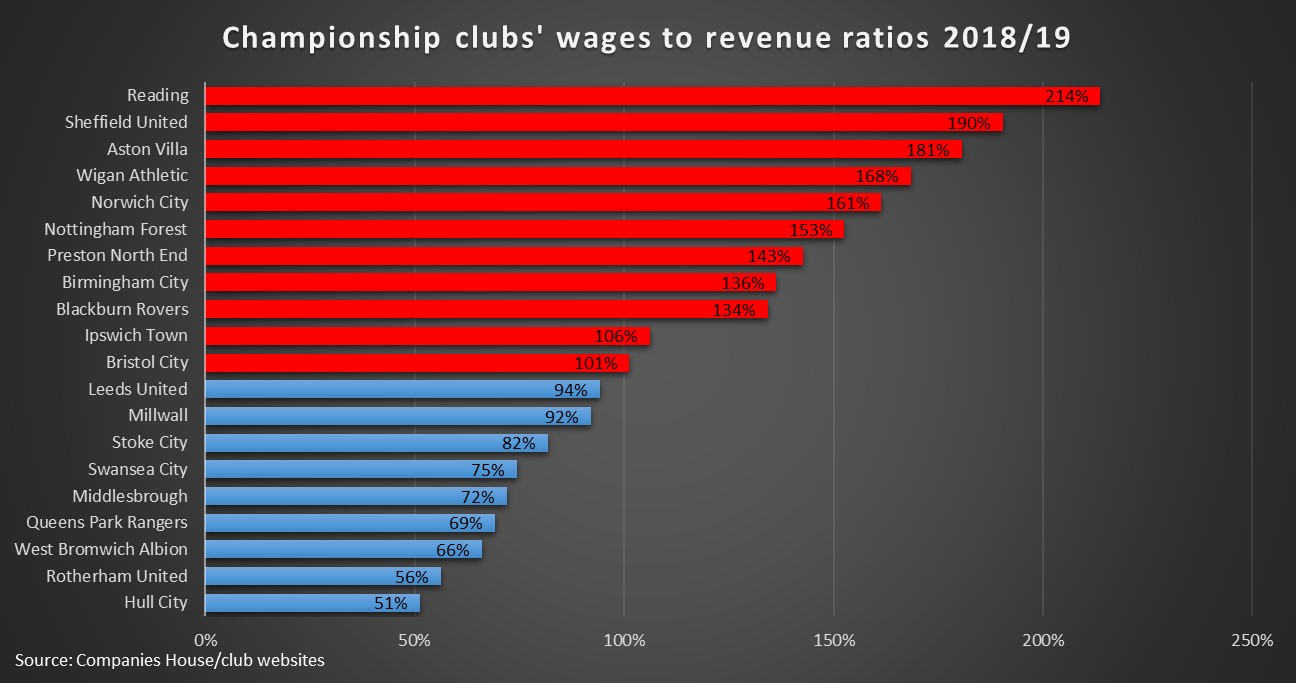
For some, the tactic paid off, with three of the five highest over-investors gaining promotion that season. However, Reading (20th league position) and Wigan Athletic (18th league position) also feature in that top five, with Reading exceeding the 200% mark, suggesting again that this high risk tactic does not always reap the associated high reward.
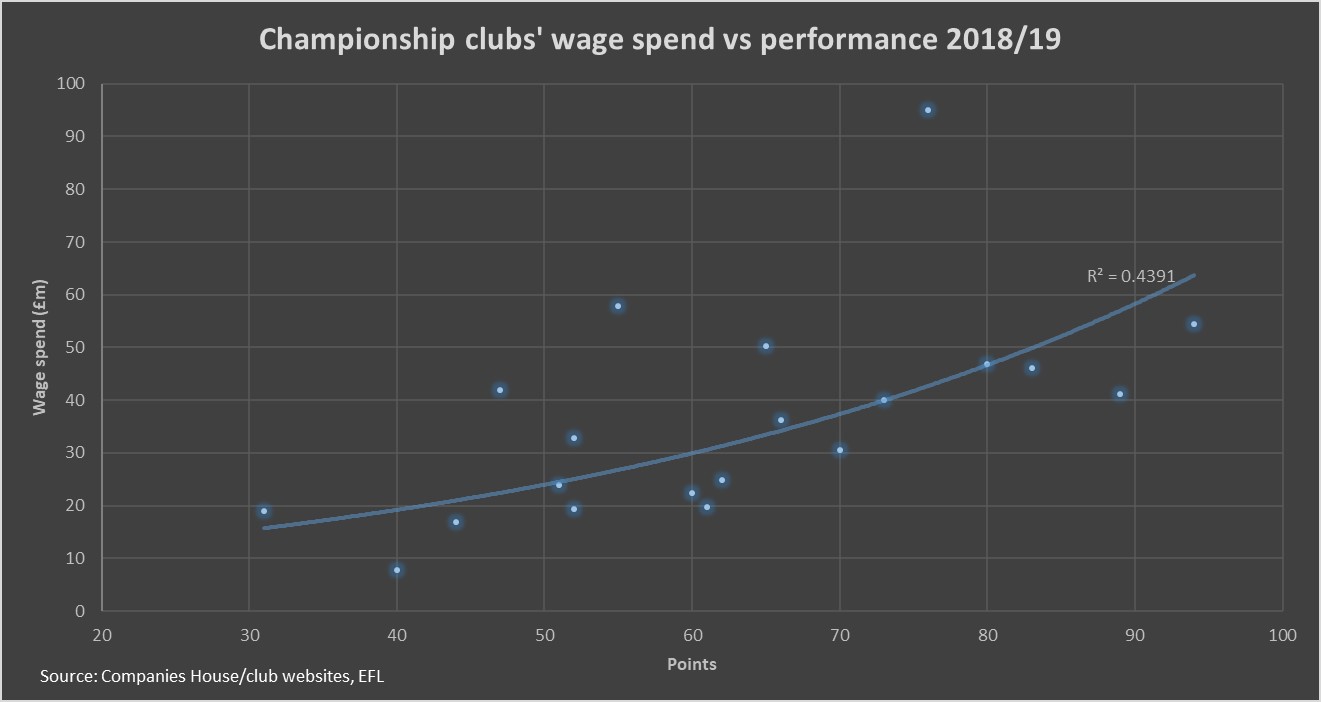
However, interestingly, there was in fact a reasonably strong correlation between wage spend and league points gained in the 2018/19 Championship. Across the 20 clubs analysed, 44% of points accumulated by clubs over the course of the season can be explained by the amount spent on wages. Although this is still less than half, previous UCFB analysis showed that this figure was around 17% for Championship clubs over the six-season period of 2012/13-2017/18, suggesting a strong upturn in the spending vs success relationship in 2018/19.
In the context of such large wage outlays and diminishing matchday cash inflows as a result of the ongoing pandemic, it easy to comprehend why many Championship clubs have deferred player or non-player wages in order to stay afloat.
These 20 clubs alone spent almost £730m in wages last season, an average of £700k per club per week. On top of this, these 20 clubs demonstrate an additional non-player cash operating cost base of c.£260m, an average of £250k per club per week.
With just under £1m required to fund the average Championship club on a weekly basis, some clubs have had no choice but to furlough staff under the government scheme or defer wages accordingly.
It also remains to be seen how the EFL will treat Profitability and Sustainability regulations, with most clubs submitting forecast 2019/20 figures as part of their three-year rolling assessment around this time of the year. While overspending clubs that did not gain promotion do have the chance to balance their finances out over a three year rolling period, the current pandemic will no doubt have an impact on many clubs’ abilities to fall within the required loss limits for the next assessment.
Equally, the current circumstances may lead Championship clubs to reconsider their business models, with the majority of existing wage expenditure patterns clearly demonstrating no allowance for breakdowns in business continuity such as those now being experienced by all.
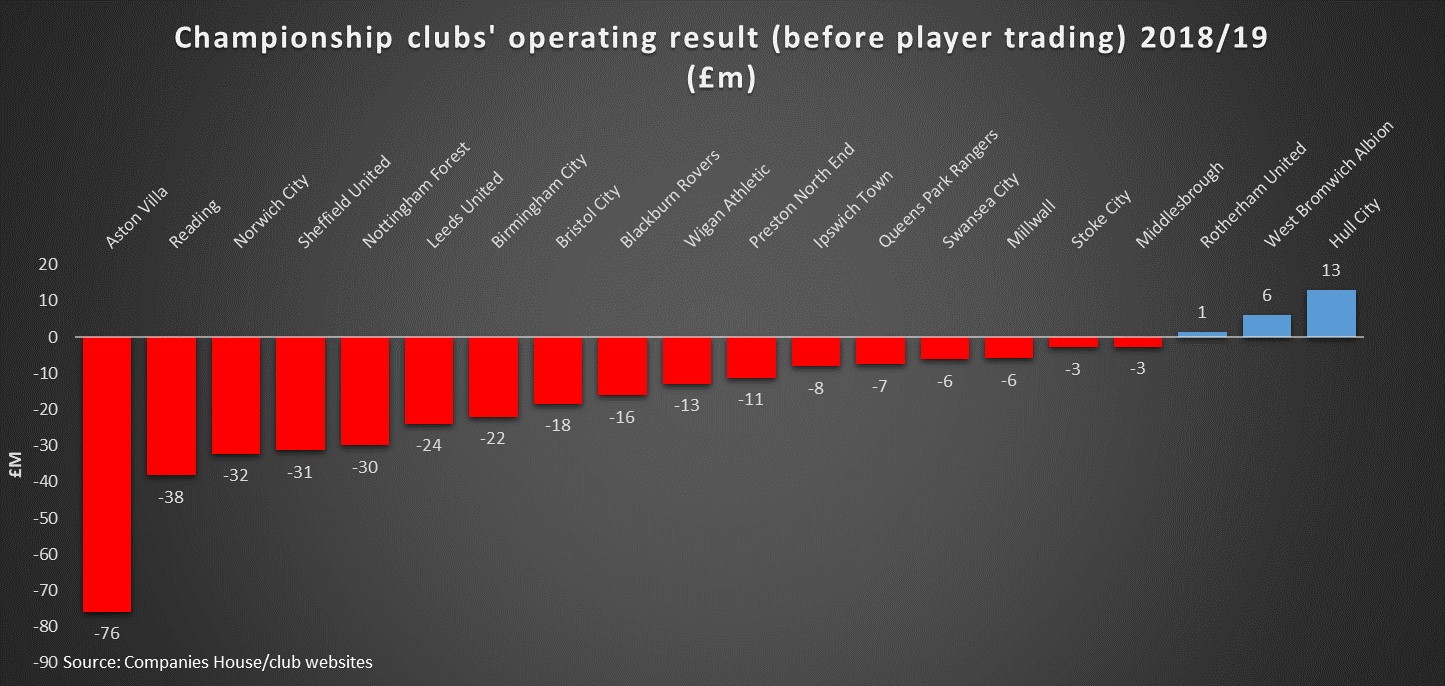
Given the aforementioned levels of income and operating expenditure, the 20 clubs’ operating results - before player trading aspects such as player contract amortisation and profit on player sales - are very much in the red. 85% of the clubs analysed show an operating loss on this basis, with just Rotherham, West Brom and Hull equating to a profit (two of which were in receipt of parachute payments).
As a result, the cumulative operating losses stand at c.£325m across these 20 clubs.
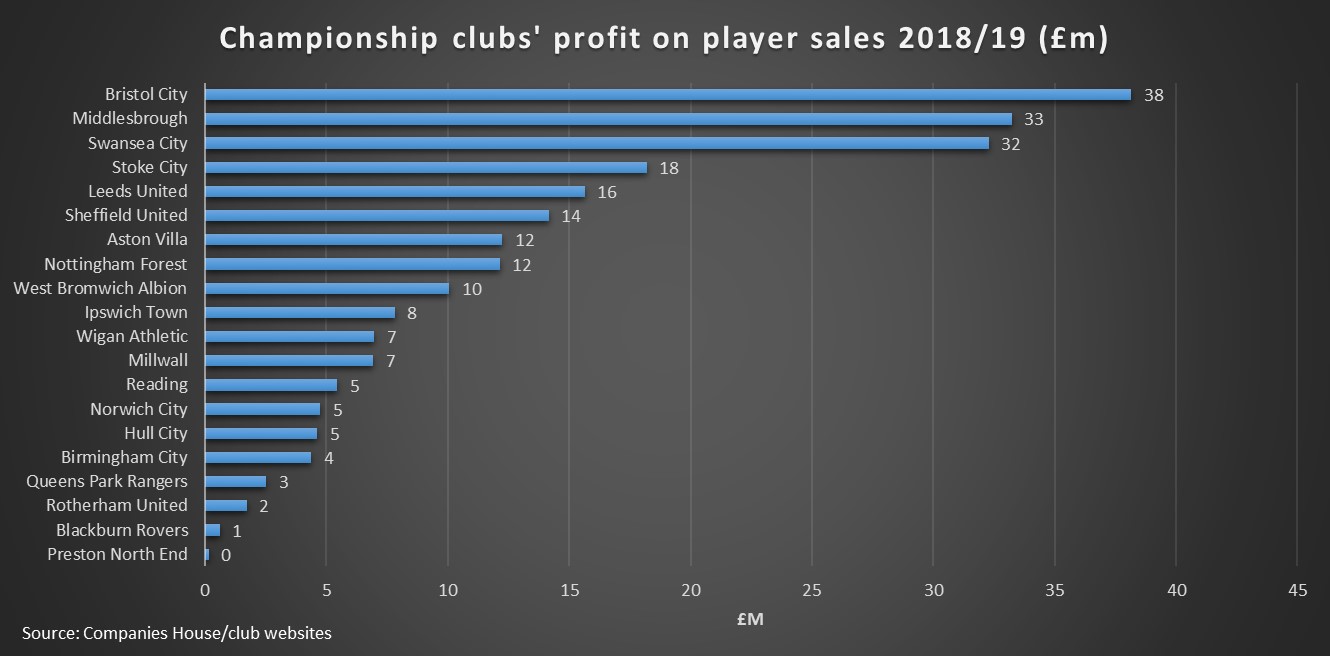
The importance of profit on player sales should not be underestimated in the context of the current suspension. These 20 Championship clubs reported cumulative profits on player sales in excess of £230m in 2018/19, roughly offsetting c.£225m of player contract amortisation. With clubs currently extremely sensitive to cash outflows, the dynamics of the 2020/21 transfer windows may be severely affected. If there is a general tightening of the purse strings, what represents a major component of many Championship clubs’ income streams may diminish, further worsening the already unsustainable pre-tax position, below.
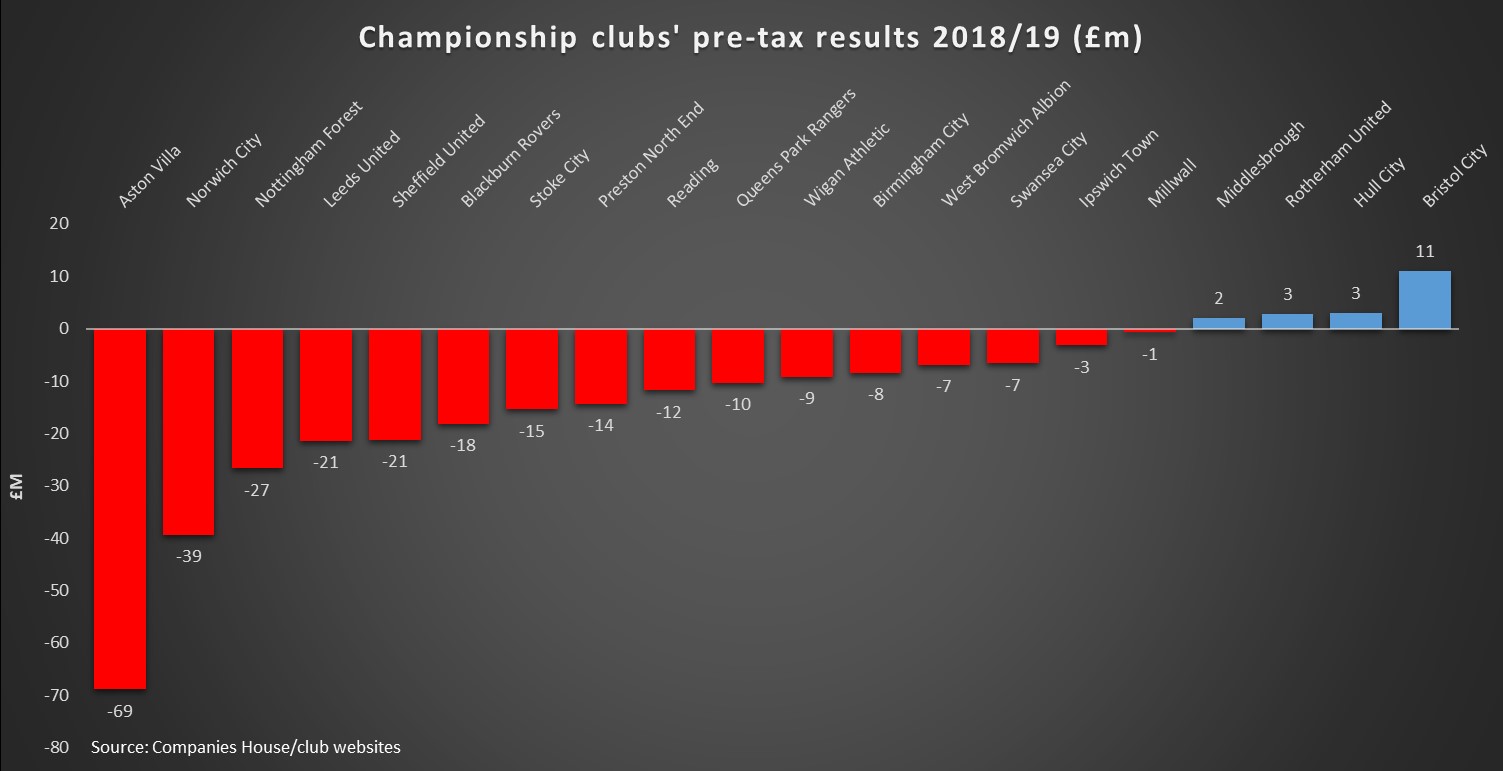
While the aforementioned levels of player amortisation and profit on player sales are roughly in balance, several one-off transactions reduced the cumulative pre-tax loss figure for the 20 clubs to c.£265m.
For example, despite recording pre-tax losses of £69m, Aston Villa actually offset a larger loss in the course of selling their stadium to their owners for a profit of c.£36m. Such transactions have been the subject of intense debate in recent times, with the likes of Derby County and Sheffield Wednesday coming under EFL scrutiny after recording similar stadia sale and leaseback transactions in their 2017/18 accounts - potentially adding further credence to the calls for wage based financial regulation to curb the use of such accounting loopholes at the pre-tax loss level.
To quote the great Pelé: “Football is easy, life is complicated.” But as life off the pitch gets increasingly complicated, the unsustainable business models of many Championship clubs may be forced to change and adapt to survive and succeed in the post-pandemic world.
















